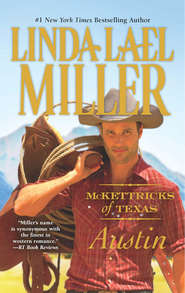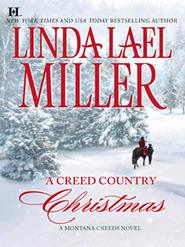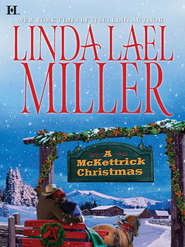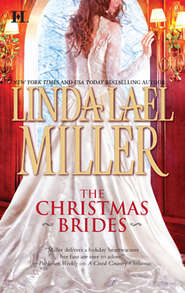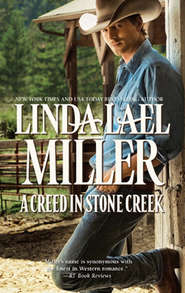По всем вопросам обращайтесь на: info@litportal.ru
(©) 2003-2024.
✖
McKettrick's Luck
Автор
Год написания книги
2019
Настройки чтения
Размер шрифта
Высота строк
Поля
She blinked a couple of times before meeting her mother’s fond gaze.
“Where’s Mitch?” Cheyenne asked.
“Inside,” Ayanna said, her words gently hushed. “I’m afraid he’s brooding again—he misses his friends in Phoenix. He’ll be all right once he’s had a little while to get used to being here.”
Cheyenne could empathize. She thought, with poignant longing, of her one-bedroom condo in sunny San Diego, half a mile from the beach. She’d sublet it, and that was another worry. If she couldn’t convince Jesse McKettrick to part with five hundred acres of prime real estate, she not only wouldn’t have a job, she’d have to stay in Indian Rock, find whatever work there was to be had and stockpile pennies until she could afford to start over somewhere else.
As she stood there despairing, Nigel’s cell-phone comment blew through her spirit like a cold wind scouring the walls of a lonely canyon. Everything’s riding on this deal. And I mean everything.
“Come on inside, honey,” Ayanna said, taking Cheyenne’s arm when she would have turned and fled back to the rental car. “We can bring your things in later.”
Cheyenne nodded, ashamed that she’d come so close, after all her preparation and effort, to fleeing the scene.
Ayanna smiled, butted her taller daughter lightly with the outside of one shoulder. “We’ve all come home,” she said softly. “You and Mitch and me. And home is a great place to start over.”
Home might be a “great place to start over,” Cheyenne reflected grimly, if you were a McKettrick. If your key fit the lock of one of the several sprawling, rustically elegant houses standing sturdily on a section of the legendary Triple M Ranch.
If your name was Bridges, on the other hand, and you were the daughter of a charming but compulsive gambler who’d died in jail, and a hardworking but fatally codependent dreamer like Ayanna, making a clean-slate beginning was a luxury you couldn’t afford.
Ordinary people had to settle for survival.
NURLEEN GENTRY SHUFFLED and dealt the flop—a pair of sevens and a queen. Once the cards were down, lying helter-skelter on the scruffy green-felt tabletop, she folded her hands, glittering with fake diamonds ordered from the shopping channel, and waited.
Jesse leaned back in his customary chair in the card room behind Lucky’s Main Street Bar and Grill and pretended to consider his options. He felt the eyes of the other poker players on him, through the stale and shifting haze of blue-gray cigarette smoke, and gave nothing away.
“Bet or fold, McKettrick,” Wade Parker grumbled from the other side of the table. Jesse allowed one corner of his mouth to crook up, ever so slightly, in the go-to-hell grin he’d been perfecting since he was eleven. Wade wore a bad rug and a windbreaker emblazoned with the logo of the beer company he worked for, and his full lips twitched with impatience. The tobacco smudge rose from the cheap cigar smoldering in the ashtray beside him.
Next to Wade was Don Rogers, who owned the Laundromat. Don squirmed on the patched vinyl seat of his chair, but Jesse knew it wasn’t the wait that bothered the other man. Don was a neat freak and wanted to tidy the flop so badly that a muscle under his right eye jerked. Touching anybody’s cards but his own could get a man shot in some parts, though the retribution would be neither swift nor terrible in the old hometown.
Could be Don had pocket queens, Jesse thought, but that didn’t seem likely. When it came to tells, Don was easier to read than the twelve-foot limestone letters set into the slope east of town, spelling out INDIAN ROCK.
Everything about Don said, WINGING IT.
Jesse made a show of pondering myriad possibilities, then accordioned four fifty-dollar chips into the pot.
“Shit,” Don muttered, and put down his cards without revealing them, one precisely on top of the other.
Wade leaned forward, his bushy eyebrows raised. Nurleen, an old hand at dealing poker and a better-than-fair player herself, though her specialty was Omaha, not Texas Hold ’Em, said nothing, but simply looked on with intense disinterest.
“I think you’re bluffing, McKettrick,” Wade said. He rifled his chips, which had been growing steadily for the last half hour.
“Think what you like,” Jesse countered, without inflection. He’d already thrown in a couple of winning hands, just to support Wade’s delusion that the poker gods were lined up solidly behind him, armed for battle. Jesse had time, and he had money—a deadly combination, in poker or just about any other endeavor.
Wade plucked a pair of sunglasses from the pocket of his windbreaker and shoved them onto his face.
A little late, Jesse thought, but this time, he kept his grin on the inside, where nobody knew about it but him.
Nurleen dealt the fourth card, known in Hold ’Em parlance as the turn.
Jesse ruminated. Even if Wade had twin aces to go with the one on the table, three of a kind wouldn’t take the pot, which meant the beer salesman was screwed. Unless the fifth card, or the river, turned out to be another ace, of course.
Bad beats happened—in the back rooms of small-town bars and the championship tournaments in Vegas and everywhere in between. Jesse’s gut said Risk it, but then, it rarely said anything else.
Out of the corner of one eye, Jesse saw someone slip through the doorway from the bar. Coins clinked into the jukebox.
After a brief intro, Kenny Rogers proclaimed the wisdom of knowing when to hold ’em, and when to fold ’em. When to walk away, and when to run.
Jesse knew all about holding and folding, but walking away was anathema to him, never mind running.
Wade matched Jesse’s bet and raised him three hundred.
Jesse responded in kind.
Nurleen turned the river card.
A deuce of hearts.
Jesse let his grin show again.
“Call,” Wade said. He pushed his wager to the middle of the table, showed his cards. King of hearts, queen of spades. He’d been counting on the lady in his hand and the one on the table to make a hand.
Nurleen sighed almost imperceptibly and shook her head.
Jesse felt a twinge of guilt as he tossed out two sevens.
Four of a kind.
Wade swore. “Damn your dumb-ass luck, Jesse,” he growled.
Nurleen gathered the cards, shuffled for a new game. “You still in, Wade? Don?”
Know when to walk away, Kenny advised. Know when to run.
Jesse spared a sidelong glance and saw his cousin Keegan leaning against the jukebox with his arms folded. He looked like a city lawyer, or even a banker, in his tailored slacks, vest and crisply pressed shirt.
Jesse cracked another grin, mostly because he knew what he was about to say would piss Keegan off. “I’m in,” he said.
“I’d like a word with you,” Keegan said, keeping his distance but looking downright implacable at the same time. “Maybe you could skip a hand.”
Wade and Don looked so hopeful that Jesse exchanged glances with Nurleen and pushed back his chair to stand and cross the floor, which was littered, in true Old West style, with peanut shells and sawdust. There might have been tobacco juice, too, if the health department hadn’t been sure to kick up a fuss. Around Indian Rock, folks took their history seriously.
“What’s so important that it can’t wait?” he asked, in a low voice that slid in under Kenny’s famous vibrato.
Keegan was the same height as Jesse, but the resemblance ended there. Keegan had reddish-brown hair, always neatly trimmed, while Jesse’s was dark blond and shaggy. Keegan had the navy-blue eyes that ran in Kade McKettrick’s lineage, and Jesse’s were the light azure common to Jeb’s descendents.
“We had a meeting, remember?” Keegan snapped.
Kenny wrapped up the song, and a silence fell. The jukebox whirred and Patsy Cline launched into “Crazy.”






